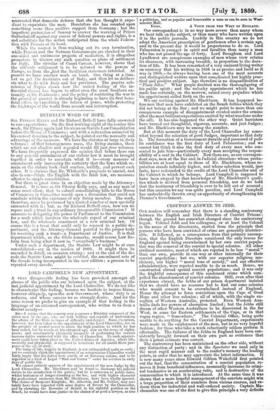BETHELL'S WORD OF HOPE.
SIR Frrznor ICE= and Sir Richard Bethell have fully answered to our expectations. On the first working night of the session this week, Sir Fitzroy again laid his views on Statute Law Consolidation before the House of Commons ; and with a reiteration animated by his earnest devotion to the subject, he pointed out the necessity and advantage of the measure. We have the statutes at large in forty volumes ; of that heterogeneous mass, the living statutes, those which are not obsolete and repealed would fill just four volumes. We have frequently expressed the opinion that before there can be any general amendment of our statute law it must be brought together in order to ascertain what it is—every measure of amendment only increasing the certainty that the laws which re- main on the statute book shall confuse, nullify, and pervert each other. It is obvious that Mr. Whiteside's proposals to amend, and also to consolidate the English with the Irish law, are measures ulterior to simple consolidation. But there is great force in an objection made by the Attorney- -General. It is true as Sir Fitzroy Kelly says, and as any man of sense must allow, that to submit consolidating bills to the House of Commons in Committee would open a discussion that could not conclude within the existence of any living member. The work, therefore, must be performed by a limited number of men specially entrusted with it ; but, as Sir Richard Bethell says, how can we repose such a trust in any ordinary irresponsible Commission ? It amounts to delegating the power of Parliament to the Commission for a work which involves the wholesale repeal of our criminal law, and the wholesale enactment of a new criminal law. Of course this is a trust that could, only be reposed in a public de- partment, and the Attorney-General pointed to the proper body for receiving such a trust—a Department of Justice. It is that department which, as the Globe remarks, would rescue Law Re- form from being what it now is, "everybody's business."
Under such a department, the Statute Law might be at once consolidated—say- in the session of 1860. It might then be amended in detail, on occasion arising ; and at the end of the de- cade the Statute Laws might be reedited, the amendment acts of the decade being incorporated in the new edition ; a process to be repeated every decade.


























 Previous page
Previous page